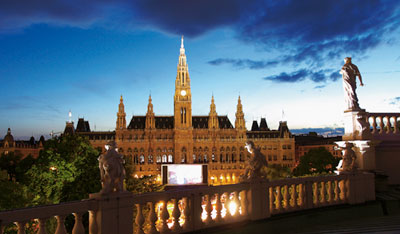About Vienna

Vienna, the capital of Austria, is a city of over 1.6 million inhabitants. It is one of the great cultural centres of Europe with a continuous history of more than 2000 years. Situated on the Danube, the first settlements arose at the cross-roads of two important trade routes: the “amber route”, connecting the Baltic countries with Italy, and the east-west route along the Danube. The latter route, together with the traces of the Roman settlement “Vindobona”, can still be seen in the layout of the city’s streets.
During the Middle Ages, Vienna rose to importance both in defending against and connecting central Europe with the East, and eventually became the capital of the vast Habsburg empire. The exceptional concentration of talent, reflected by the great achievements in music, art, and the sciences, was a consequence of Vienna’s role as a meeting place of a large number of different nations and traditions. Although much reduced in importance by the break-up of the Austro-Hungarian monarchy at the end of World War I, and placed on the periphery of the western world as a consequence of World War II, Vienna has retained its role as one of the leading capitals of Europe. Since the fall of the Iron Curtain it has successfully resumed its tradition of connecting the East and the West.
Today Vienna is a thriving international city, integrating the rich inheritance of a glorious past with a dynamic approach to the modern world. As a seat of numerous international organisations and an important turntable for business enterprises, Vienna is at the same time a city of operas, concert halls, theatres, universities, museums, and, last but not least, of coffee houses and “Heurigen”.
For more information see Vienna's tourist information.